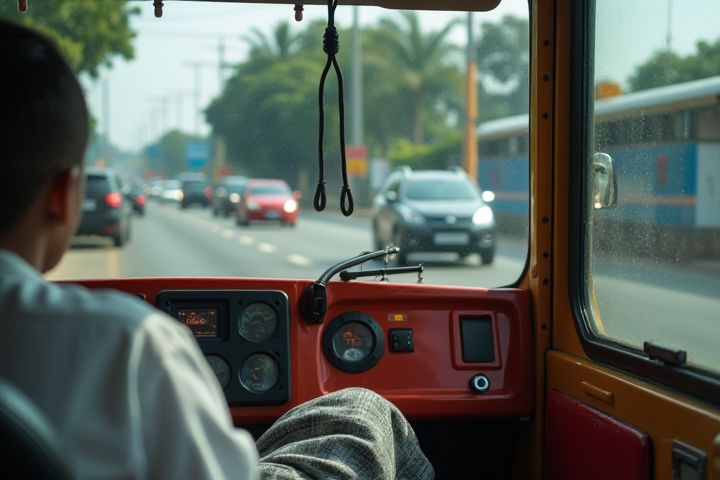
Public transportation in Nigeria encompasses diverse modes including buses, taxis, and tricycles, primarily known as "Keke Napep." City buses operate on established routes in major urban areas like Lagos and Abuja, facilitating affordable commuting for millions. Ride-hailing services, such as Uber and Bolt, have emerged, offering convenient alternatives while also promoting safety and efficiency. The Lagos Bus Rapid Transit (BRT) system is a notable initiative aimed at reducing congestion and improving travel times in the city. Embracing this network not only enhances your mobility but also supports the broader goals of urban development and sustainability in Nigeria.
Existence of Danfo minibuses
The Danfo minibuses serve as a vital component of public transportation in Nigeria, primarily operating in urban areas like Lagos. Characterized by their distinctive yellow color, these minibuses accommodate approximately 14 passengers, offering an affordable and accessible means of travel for commuters. You can find Danfo buses navigating busy streets, providing an efficient alternative to car travel, despite their often crowded and chaotic nature. The presence of Danfo minibuses highlights the informal yet essential role of private transport operators in addressing the demands of Nigeria's growing population.
BRT (Bus Rapid Transit) system in Lagos
The Bus Rapid Transit (BRT) system in Lagos, Nigeria, significantly enhances urban mobility by providing a dedicated network of bus lanes, reducing congestion and travel time. This environmentally friendly mode of transportation utilizes modern buses equipped with amenities to ensure passenger comfort and safety. With strategic routes connecting key areas, the BRT service facilitates easy access to workplaces, education centers, and commercial districts, thereby promoting economic activities. By opting for the BRT, you contribute to a reduction in carbon emissions while enjoying a reliable means of commuting across the bustling city.
Popularity of Okadas (motorcycle taxis)
In Nigeria, motorcycle taxis, commonly known as Okadas, have surged in popularity due to their affordability and ability to navigate through congested traffic. These two-wheeled vehicles serve as a crucial component of urban transport, especially in cities like Lagos and Ibadan, where road infrastructure struggles to keep pace with rapid population growth. Safety concerns and regulatory challenges have prompted discussions about the need for safety measures and structured guidelines for Okada usage. Understanding this evolving public transportation landscape can help you make informed choices about your commuting options in Nigeria.
Use of Keke Napep (tricycle taxis)
Public transportation in Nigeria prominently features Keke Napep, which are tricycle taxis essential for urban mobility. These vehicles, known for their compact size and fuel efficiency, navigate through congested city streets, making them a popular choice among commuters. Keke Napep services are often affordable, offering an economical alternative to private cars and buses. You can find them operating in various cities, providing both short trips and last-mile connectivity to major public transport hubs.
Importance of train services
Train services in Nigeria play a vital role in enhancing public transportation by providing an efficient, cost-effective alternative to road travel. The expansion of railway infrastructure not only reduces traffic congestion in urban areas but also contributes to reduced carbon emissions and environmental sustainability. With improved train services, residents can enjoy faster commutes and better connectivity between cities, promoting economic growth and accessibility. Investing in rail transport enhances the overall public transport system, making it a crucial component of Nigeria's infrastructure development.
Road congestion issues
Public transportation in Nigeria faces significant challenges due to road congestion, which impacts travel time and efficiency. Major cities like Lagos and Abuja struggle with increasing vehicle numbers, exacerbating traffic snarls and leading to delays in bus services and commuter transit. The government is pushing for improvements in infrastructure, such as dedicated bus lanes and intermodal transport hubs, to alleviate these congestion problems. Utilizing public transport options not only reduces your carbon footprint but also contributes to easing road congestion for everyone in the community.
Negotiating fares
Public transportation in Nigeria predominantly involves negotiating fares for various travel modes, including buses, taxis, and the informal "danfo" minivans. Passengers often engage in haggling to determine costs, as fares are not fixed; this practice reflects local customs and economic conditions. In major cities like Lagos and Abuja, ride-hailing services are becoming increasingly popular, offering more transparent pricing options for commuters. Understanding this fare negotiation practice is essential for both locals and visitors navigating the bustling transit systems across Nigeria.
Naira as currency for fare
Public transportation in Nigeria predominantly utilizes the Naira as the primary currency for fare payments, reflecting the nation's economic framework. This system includes various modes such as buses, taxis, and motorcycles, catering to millions of commuters daily. The fare structure is often influenced by distance, type of service, and demand, which can fluctuate based on peak hours. Utilizing digital payment methods is becoming more common, making it easier for you to travel conveniently while contributing to a more efficient transportation network.
Safety concerns
Public transportation in Nigeria is increasingly emphasizing safety measures to address the country's unique challenges. Various transportation modes, such as buses and taxis, are being equipped with GPS tracking systems and surveillance cameras to enhance passenger security. Regulatory bodies are implementing stricter safety standards and inspection protocols for vehicles to reduce the risk of accidents. As a user, you can benefit from this growing focus on safety by choosing services that prioritize secure travel experiences.
Various ride-hailing apps available
In Nigeria, public transportation increasingly incorporates various ride-hailing apps, enhancing urban mobility and accessibility. Popular platforms like Uber, Bolt, and InDriver provide users with convenient, on-demand transport options, allowing you to book rides seamlessly via mobile applications. These services often integrate cashless payment methods, promoting a safer and more efficient travel experience. By leveraging GPS technology, ride-hailing apps help to reduce wait times and optimize routes, reshaping the landscape of transportation in Nigeria's bustling cities.
